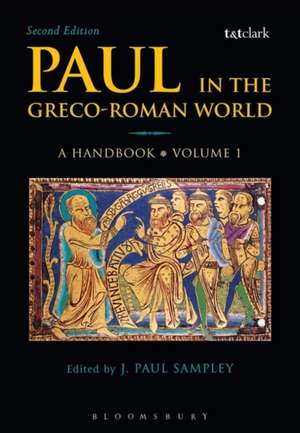Paul in the Greco-Roman World: A Handbook: Volume I
Editat de Dr J. Paul Sampleyen Limba Engleză Hardback – 5 oct 2016
Preț: 916.81 lei
Preț vechi: 1118.06 lei
-18% Nou
Puncte Express: 1375
Preț estimativ în valută:
175.43€ • 191.16$ • 147.83£
175.43€ • 191.16$ • 147.83£
Carte indisponibilă temporar
Doresc să fiu notificat când acest titlu va fi disponibil:
Se trimite...
Preluare comenzi: 021 569.72.76
Specificații
ISBN-13: 9780567656711
ISBN-10: 0567656713
Pagini: 448
Dimensiuni: 169 x 244 mm
Greutate: 1.01 kg
Ediția:2
Editura: Bloomsbury Publishing
Colecția Bloomsbury T&T Clark
Locul publicării:London, United Kingdom
ISBN-10: 0567656713
Pagini: 448
Dimensiuni: 169 x 244 mm
Greutate: 1.01 kg
Ediția:2
Editura: Bloomsbury Publishing
Colecția Bloomsbury T&T Clark
Locul publicării:London, United Kingdom
Caracteristici
New edition provides essays on Paul and memory, and Pauline economics. All other contributions have been fully revised to take into account the - sometimes - significant changes since the original volume was published
Notă biografică
J. Paul Sampley is Professor Emeritus of New Testament and Christian Origins at Boston University, USA. He is the co-editor of Pauline Parallels (1984) and "1 Corinthians" and "2 Corinthians" in the New Interpreter's Bible, and Walking in Love (2016).
Cuprins
AcknowledgementsAbbreviationsIntroduction1. Paul and Adaptability, Clarence E. Glad, The Reykjavik Academy and the Icelandic Research Council. 2. Paul, Adoption and Inheritance, James C. Walters, Boston University, USA. Revised by Jerry L. Sumney, Lexington Theological Seminary, USA3. Paul and Associations, Richard S. Ascough, Queen's University, Canada4. Paul and Boasting, Duane F. Watson, Malone College, USA5. Paul and Circumcision, Troy W. Martin, Saint Xavier University, USA6. Paul and Commendation, Efrain Agosto, Hartford Seminary, USA7. Paul, Exemplification, and Imitation, Benjamin Fiore, S.J, Georgetown University, USA. Revised by Thomas R. Blanton, Lutheran School of Theology at Chicago, USA8. Paul and Rhetorical Comparison, Christopher Forbes, Macquarie University, Australia9. Paul and Greco-Roman Education, Ronald F. Hock, University of Southern California, USA10. Paul and Family Life, Margaret Y. MacDonald, Saint Mary's University, Canada11. Paul and the Greek Novel, Loveday Alexander, University of Sheffield, UK12. Paul and Frankness, J. Paul Sampley, Boston University, USA13. Paul and Friendship, John T. Fitzgerald, University of Miami, USA14. Paul and the Games, Alan H. Cadwallader, Australian Catholic University, AustraliaIndex
Recenzii
I warmly welcome a revised and enlarged edition of Paul in the Greco-Roman World! Professor J. Paul Sampley, his accomplished colleagues. and Bloomsbury T&T Clark are to be highly commended for producing a collection of informative, interesting, and, in not a few instances, important essays. These insightful contributions - now twenty-nine in number - enable Pauline interpreters to understand better the Jewish Apostle to the Gentiles as well as his 'weighty. forceful' letters bequeathed to us.
This volume, edited by Paul Sampley with contributions by the core experts in the field has become a classic which has established itself as a must in students' and scholars' libraries over the past one and half decades. This editions includes eight additional contributions on themes which has become the focus in the field since the publication of the first edition, ie on associations, circumcision, family life, Greek novels, literacy, marriage and divorce, memory, performance, social memory, and a concluding comprehensive epilogue by Paul Sampley himself which relates to the individual contributions within his proposed taxonomy. The volume is a masterpiece of knowledge and critical analysis of the Greco-Roman context of the Jewish apostle's letters and will continue to be an essential tool for Pauline scholars.
Sampley has captured the historical value of the recent surge of interest in the Greco-Roman setting of the Pauline letters. His method is novel. Twenty-one themes had been allocated to individual specialists, each working to a pattern that focussed an ancient socio-cultural phenomenon on some specific passage(s) in the letters. From 'Adaptability' to 'Virtue and Vice' they are taken in alphabetical order. But already our understanding of historical culture was moving on. Seventeen of the studies have been updated by their original authors. Four now have even radically different treatments by new authors and there are eight wholly new perspectives.
Paul's complex, often paradoxical engagement with his social and cultural world is the key to understanding his writings and his unique role in the formation of what we call Christianity. In these two volumes we have summaries of cutting-edge scholarship in that field, present in clear and lively language.
This volume, edited by Paul Sampley with contributions by the core experts in the field has become a classic which has established itself as a must in students' and scholars' libraries over the past one and half decades. This editions includes eight additional contributions on themes which has become the focus in the field since the publication of the first edition, ie on associations, circumcision, family life, Greek novels, literacy, marriage and divorce, memory, performance, social memory, and a concluding comprehensive epilogue by Paul Sampley himself which relates to the individual contributions within his proposed taxonomy. The volume is a masterpiece of knowledge and critical analysis of the Greco-Roman context of the Jewish apostle's letters and will continue to be an essential tool for Pauline scholars.
Sampley has captured the historical value of the recent surge of interest in the Greco-Roman setting of the Pauline letters. His method is novel. Twenty-one themes had been allocated to individual specialists, each working to a pattern that focussed an ancient socio-cultural phenomenon on some specific passage(s) in the letters. From 'Adaptability' to 'Virtue and Vice' they are taken in alphabetical order. But already our understanding of historical culture was moving on. Seventeen of the studies have been updated by their original authors. Four now have even radically different treatments by new authors and there are eight wholly new perspectives.
Paul's complex, often paradoxical engagement with his social and cultural world is the key to understanding his writings and his unique role in the formation of what we call Christianity. In these two volumes we have summaries of cutting-edge scholarship in that field, present in clear and lively language.
